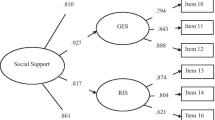Conclusion
The SS-B appears to be a promising measure of five modes of available supportive behavior: emotional support, socializing, practical assistance, financial assistance, and advice/guidance. The measure was designed to assess supportive behavior available from family and from friends. For specific purposes the measure might be modified to tap enacted supportive behavior, as was done in Study 4, or might focus on different sources (cf. Tardy, 1985). Further evidence of the divergence of mode-specific scales would be valuable and might be demonstrated by comparing samples with mode-specific deficits, by comparing support received for different problem types (in a more sophisticated fashion than was done here), and by showing differentiated associations between modes of support and various outcome variables. The reliable and valid assessment of specific modes of supportive behavior is an important agenda item in social support research: Such a measure would allow more elaborate theories to be tested, and will undoubtedly prove essential in a complete understanding of social support processes.
Similar content being viewed by others
References
Barrera, M., Jr. (1981). Social support in the adjustment of pregnant adolescents: Assessment issues. In B. Gottlieb (Ed.),Social networks and social support. Beverly Hills: Sage.
Barrera, M., Jr., & Ainlay, S. (1983). The structure of social support: A conceptual and empirical analysis.Journal of Community Psychology, 11, 133–143.
Barrera, M., Jr., Sandier, I N., & Ramsay, T. B. (1981). Preliminary development of a scale of social support: Studies on college students.American Journal of Community Psychology, 9, 435–447.
Cohen, S., & Hoberman, H. (1983). Positive events and social supports as buffers of life change stress.Journal of Applied Social Psychology, 13, 99–125.
Cohen, S., & McKay, G. (1984). Social support, stress, and the buffering hypothesis: A theoretical analysis. In A. Baum, G. E. Singer, & S. E. Taylor (Eds.),Handbook of psychology and health (Vol. 4, pp. 253–268). Hillsdale, NJ: Erlbaum.
Evenson, R. C., Holland, R. A., Mehta, S., & Yasin, F. (1980). Factor analysis of the Symptom Checklist 90.Psychological Reports, 46, 695–699.
Gorsuch, R. L. (1983).Factor analysis. Hillsdale, NJ: Erlbaum.
Gottlieb, B. H. (1978). The development and application of a classification scheme of informal helping behaviors.Canadian Journal of Behavioral Science, 10, 105–115.
Heller, K., & Swindle, R. W. (1983). Social networks, perceived support, and coping with stress. In R. D. Felner, L. A. Jason, J. N. Moritsugu, & S. S. Farber (Eds.),Preventive psychology: Theory, research, and practice. New York: Pergamon.
Hirsch, B. (1980). Natural support systems and coping with major life changes.American Journal of Community Psychology, 8, 159–172.
Holahan, C. J., & Moos, R. H. (1983). Social support and adjustment: Predictive benefit of social climate indices.American Journal of Community Psychology, 10, 403–415.
Mitchell, R. E., & Trickett, E. J. (1980). Social networks as mediators of social support: An analysis of the effects and determinants of social networks.Community Mental Health Journal, 16, 27–44.
Lohr, J. M., & Bonge, D. (1980). Relationship of coronoary-prone behavior and irrational beliefs in college-age and older males.Psychological Reports, 47, 1267–1274.
Oritt, E. J., Behrman, J., & Paul, S. C. (1982).Social support: Conditions related to satisfaction with perceived support. Paper presented at the meeting of the American Psychological Association, Washington, DC.
Pattison, E. (1977). A theoretical-empirical base for social system therapy. In E. F. Feulks, R. M. Wintrob, J. Westermeyer, & A. R. Favazza (Eds.),Current perspectives in cultural psychiatry. New York: Spectrum.
Procidano, M., & Heller, K. (1983). Measures of perceived social support from friends and family: Three validation studies.American Journal of Community Psychology, 11, 1–24.
Sandier, I. N., & Barrera, M., Jr. (1980).Social support as a stress buffer: A multi-method investigation. Paper presented at the meetings of the American Psychological Association, Montreal, Canada.
Sarason, I. G., Levine, H. M., Basham, R. B., & Sarason, B. (1983). Assessing social support: The Social Support Questionnaire.Journal of Personality and Social Psychology, 44, 127–139.
Stewart, D., & Vaux, A. (in press). Social support resources, behavior, and perceptions among black and white college students.Journal of Multicultural Counseling and Development.
Stewart, D., & Vaux, A. (1986). Social support resources, behavior, and perceptions among black and white college students.Journal of Multicultural Counseling and Development, 14, 65–72.
Stokes, J. P. (1983). Predicting satisfaction with social support from social network structure.American Journal of Community Psychology, 11, 141–152.
Stokes, J. P., & Wilson, D. G. (1984). The Inventory of Socially Supportive Behaviors: Dimensionality, prediction, and gender differences.American Journal of Community Psychology, 12, 53–70.
Tardy, C. H. (1985). Social support measurement.American Journal of Community Psychology, 13, 187–202.
Thoits, P. (1982). Conceptual, methodological, and theoretical problems in studying social support as a buffer against life stress.Journal of Health and Social Behavior, 23, 145–159.
Tolsdorf, C. (1976). Social networks, support and coping: An exploratory study.Family Process, 15, 407–417.
Turner, R. J., Frankel, B. G., & Levin, D. M. (1983). Social support: Conceptualization, measurement, and implications for mental health. In J. R. Greenley (Ed.),Research in community and mental health. Greenwich, CT: JAI Press.
Vaux, A. (1982).Measures of three levels of social support: Resources, behaviors, and feelings. Unpublished manuscript.
Vaux, A., & Burda, P., Jr. (1981).Mechanisms of social support. Paper presented at the meeting of the Midwestern Eco-Cnmmunitv Psychology Interest Group, Chicago.
Vaux, A., Burda, P., Jr., & Stewart, D. (1986). Orientation toward utilizing support resources.Journal of Community Psychology, 14, 159–170.
Vaux, A., & Harrison, D. (1985). Support network characteristics associated with support satisfaction and perceived support.American Journal of Community Psychology, 13, 245–268.
Vaux, A., & Wood, J. (1986).Social support resources, behaviors and appraisals: A path analysis. Paper presented at the meeting of the Midwestern Psychological Association in Chicago.
Vaux, A., Phillips, J., Thomson, B., Holly, L., Williams D., & Stewart, D. (1986). The Social Support Appraisals (SSA) Scale: Studies of reliability and validity.American Journal of Community Psychology, 14, 195–220.
Author information
Authors and Affiliations
Rights and permissions
About this article
Cite this article
Vaux, A., Riedel, S. & Stewart, D. Modes of social support: The social support behaviors (SS-B) scale. Am J Commun Psychol 15, 209–232 (1987). https://doi.org/10.1007/BF00919279
Issue Date:
DOI: https://doi.org/10.1007/BF00919279




